Stray voltages
There are obvious electrical dangers where sheds have been knocked or partly damaged as a result of the heavy snowfall over the past week. There are also concerns about snow and moisture falling on exposed sockets in sheds. The east wind experienced last week meant that snow accumulated in parts of sheds not designed to withstand such high levels of moisture. The ESB has provided some advice for farmers to take into account as their farms return to normality.
Cattle are much more sensitive to electric shocks than humans so it is important to minimise voltage differences which can occur between metal components and earth locations such as milking parlours and livestock sheds. The way this is done is through equipotential bonding. What this means is that every part of the exposed metalwork is electrically bonded together and bonded to earth, so that there are no potentially dangerous voltage differences to cause electric shocks. Apart from the obvious danger to the lives of both farmers and livestock it should be noted that quite low voltages can reduce milk production and cause mastitis in cows.
Where sheds have been damaged due to the recent conditions, it is important that this bonding has not been affected and that there are no stray voltages.
Making repairs
If you are unsure about the safety of the shed, then the power should be turned off immediately at the fuse box and a registered electrician called before you do anything else. The same advice applies whether the shed has collapsed or sockets have got moisture into them.
Richie Young, ESB customer service supervisor, had some advice for farmers trying to deal with damaged sheds. “The first thing to remember is when it comes to repairing a damaged shed it means that somebody is going to be working at a height. Not only is there the major danger of falling but overhead lines are also a huge concern,” according to Richie.
“The first thing that you have to do is assess the yard that you are in and if there are overhead wires then you need to contact the ESB. If it delays work until someone can come out and look at the site it is worth it.”
“A lot of these repairs will be undertaken on sheds in remote locations and with the power to the damaged shed turned off, it will mean that power will have to be brought from adjoining sheds or a generator. Pulling extension leads that are not fit for purpose across farmyards could be lethal. Farmers should ensure they are using the correctly IP-rated extension leads. It is also vital that the cable is waterproof, it could be the difference between life and death.
“Where a farmer or contractor is using an electric welder they need to ensure that there is an adequate mains power supply to the shed. Because currents of 300 amps or more are needed for welding a 32-amp plug socket is required. In these instances, a generator would be needed.
“When it comes to the type of tools that contractors are using to repair sheds, they should be using 110V portable tools as opposed to 220V tools as they are much safer,” Richie said.
Plug sockets
Danger may be present where old plug sockets got wet during the storm. Plug sockets are designed to shut off immediately when small amounts of water enter the outlet, but there is no guarantee that this will always happen with old or faulty sockets. Turning the power off at the fuse box is recommended where you have a wet socket. Do not remove, use or repair the outlet if you aren’t positive the power is switched off.
Where outlets have been damaged by water the best course of action is to get an electrician to replace these outlets.
Industrial-type plugs and sockets with a minimum IP rating of 44 must be used in agricultural buildings. Two types and sizes will cover almost all uses on farms. The 16 amp size will supply most portable tools whereas a larger 32 amp size should be used for electrical welders, for example.
The general advice is to have plugs and sockets that are likely to be hosed down more protected, but with conditions seen over the past week all sockets could be affected by moisture.
“It is also important that the fuse board is fitted with proper residual current devices (RCDs),” according to Richie. In simple terms, this will detect an abnormal leakage of electricity from a circuit which could occur when a cable is damaged or a fault develops on an appliance or portable electric tool, possibly caused by moisture.
Read more
Feed delivery delays after Storm Emma
21 weanlings killed as snow blown into shed
Farmers advised to disinfect wells after snow
Stray voltages
There are obvious electrical dangers where sheds have been knocked or partly damaged as a result of the heavy snowfall over the past week. There are also concerns about snow and moisture falling on exposed sockets in sheds. The east wind experienced last week meant that snow accumulated in parts of sheds not designed to withstand such high levels of moisture. The ESB has provided some advice for farmers to take into account as their farms return to normality.
Cattle are much more sensitive to electric shocks than humans so it is important to minimise voltage differences which can occur between metal components and earth locations such as milking parlours and livestock sheds. The way this is done is through equipotential bonding. What this means is that every part of the exposed metalwork is electrically bonded together and bonded to earth, so that there are no potentially dangerous voltage differences to cause electric shocks. Apart from the obvious danger to the lives of both farmers and livestock it should be noted that quite low voltages can reduce milk production and cause mastitis in cows.
Where sheds have been damaged due to the recent conditions, it is important that this bonding has not been affected and that there are no stray voltages.
Making repairs
If you are unsure about the safety of the shed, then the power should be turned off immediately at the fuse box and a registered electrician called before you do anything else. The same advice applies whether the shed has collapsed or sockets have got moisture into them.
Richie Young, ESB customer service supervisor, had some advice for farmers trying to deal with damaged sheds. “The first thing to remember is when it comes to repairing a damaged shed it means that somebody is going to be working at a height. Not only is there the major danger of falling but overhead lines are also a huge concern,” according to Richie.
“The first thing that you have to do is assess the yard that you are in and if there are overhead wires then you need to contact the ESB. If it delays work until someone can come out and look at the site it is worth it.”
“A lot of these repairs will be undertaken on sheds in remote locations and with the power to the damaged shed turned off, it will mean that power will have to be brought from adjoining sheds or a generator. Pulling extension leads that are not fit for purpose across farmyards could be lethal. Farmers should ensure they are using the correctly IP-rated extension leads. It is also vital that the cable is waterproof, it could be the difference between life and death.
“Where a farmer or contractor is using an electric welder they need to ensure that there is an adequate mains power supply to the shed. Because currents of 300 amps or more are needed for welding a 32-amp plug socket is required. In these instances, a generator would be needed.
“When it comes to the type of tools that contractors are using to repair sheds, they should be using 110V portable tools as opposed to 220V tools as they are much safer,” Richie said.
Plug sockets
Danger may be present where old plug sockets got wet during the storm. Plug sockets are designed to shut off immediately when small amounts of water enter the outlet, but there is no guarantee that this will always happen with old or faulty sockets. Turning the power off at the fuse box is recommended where you have a wet socket. Do not remove, use or repair the outlet if you aren’t positive the power is switched off.
Where outlets have been damaged by water the best course of action is to get an electrician to replace these outlets.
Industrial-type plugs and sockets with a minimum IP rating of 44 must be used in agricultural buildings. Two types and sizes will cover almost all uses on farms. The 16 amp size will supply most portable tools whereas a larger 32 amp size should be used for electrical welders, for example.
The general advice is to have plugs and sockets that are likely to be hosed down more protected, but with conditions seen over the past week all sockets could be affected by moisture.
“It is also important that the fuse board is fitted with proper residual current devices (RCDs),” according to Richie. In simple terms, this will detect an abnormal leakage of electricity from a circuit which could occur when a cable is damaged or a fault develops on an appliance or portable electric tool, possibly caused by moisture.
Read more
Feed delivery delays after Storm Emma
21 weanlings killed as snow blown into shed
Farmers advised to disinfect wells after snow



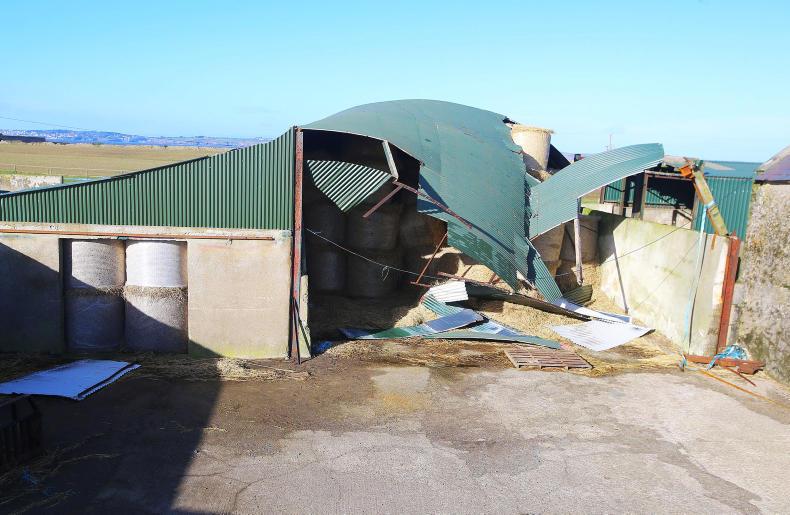
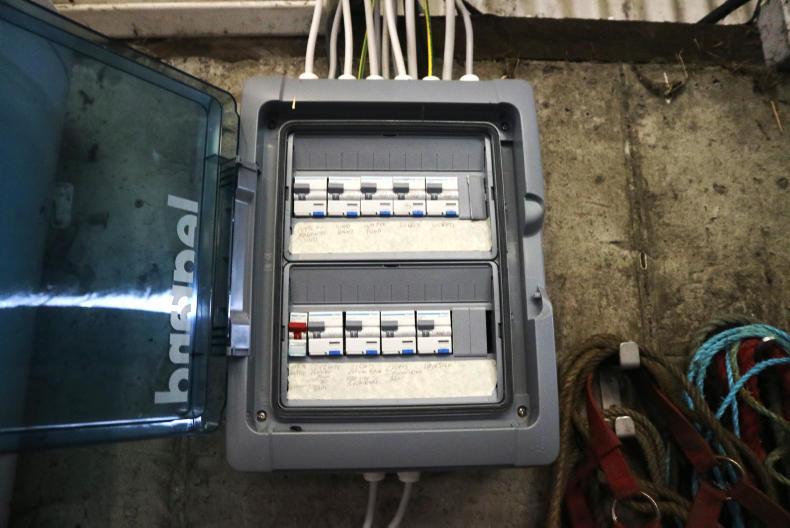


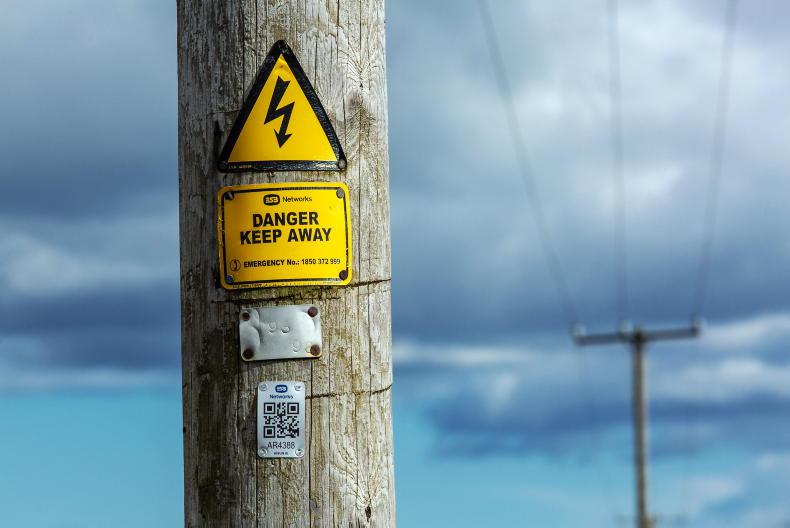


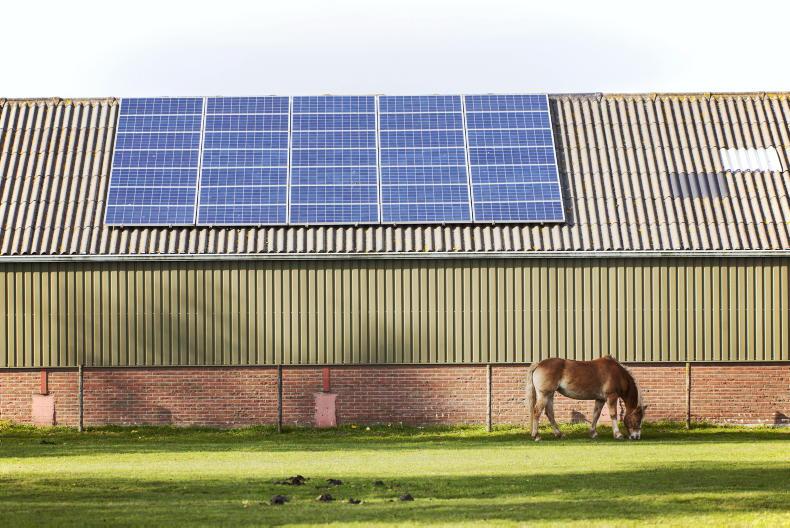
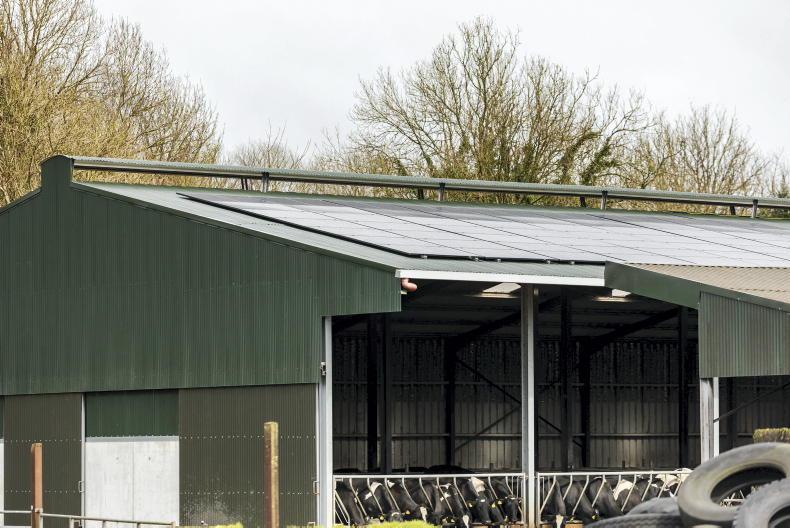
SHARING OPTIONS